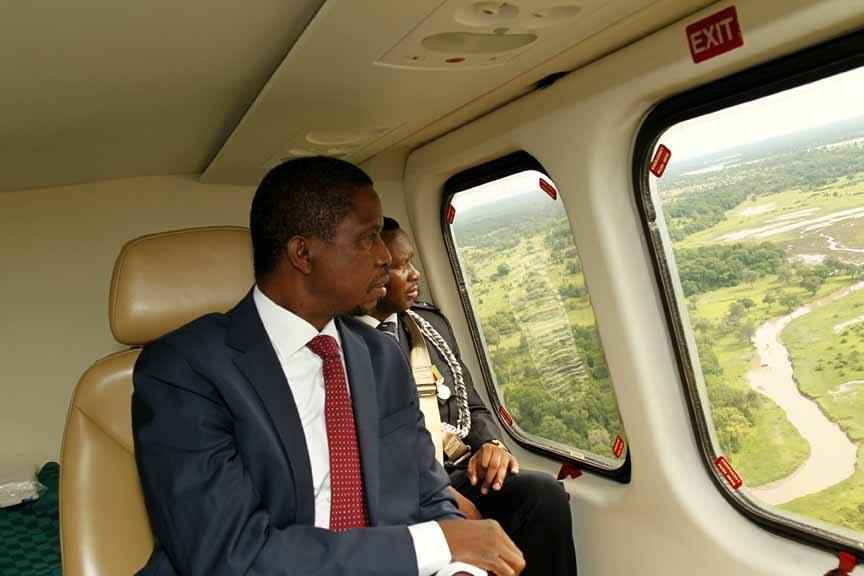
President Edgar Lungu on a helicopter ride viewing the South Luangwa National Park during a holiday he took two weeks into office. Picture used with permission of Salim Henry/SHENPA.
Barely two weeks in office, newly elected Zambian president Edgar Lungu surprised the nation when he took a holiday, fueling speculation about his health — a topic that came up in the campaigns leading up to the January 20 elections to replace President Michael Sata, who died in office on October 28, 2014.
Just after winning the election to replace Sata, Lungu underwent medical tests at Lusaka Trust Hospital and Maina Soko Military Hospital, both of which are within a short distance from the presidential palace in the Woodlands district of the capital city. Departing from his predecessor’s practice of not announcing his health-related matters, Lungu’s press aide Amos Chanda said in a statement:
His Excellency Mr. Edgar Chagwa Lungu, President of the Republic of Zambia has today undergone two medical examinations at Maina Soko Military Hospital and Lusaka Trust Hospital respectively.
President Lungu undertook a Baseline Health Parameters routine check-up at Maina Soko and attended the dentistry at Lusaka Trust Hospital. Doctors have given him a clean bill of health.
Nevertheless, his holiday, which began after his first international assignment on a trip to the African Union (AU) summit in the Ethiopian capital, Addis Ababa, raised eyebrows. Lawyer-turned-politician Lungu, who went to the South Luangwa National Park, one of Zambia’s prime tourist destinations, had not finished picking his Cabinet at the time.
President Lungu, quoted in The Post, defended his decision to go on what he called a retreat:
I told you that I will have no honeymoon. There is a difference between a holiday and a retreat, I was looking at the dictionary this morning and I said, ‘do these people know?’
I am going for a retreat, I am not on holiday. You don’t go on holiday with the full complement of office staff. The Secretary to the Cabinet is going and some of my ministers and State House officials are not going to nurse me, but help me think through the appointments I am making.
He added:
I know my priorities; some cheeky fellows are saying ‘Lungu doesn’t know his priorities’. My priority is the people of Zambia. How I treat my work is not anybody’s prerogative, it is mine.
In the run-up to the January 20 election, Opposition United Party for National Development Vice President Canicius Banda, a medical doctor, said that the burden of proof lay with ruling Patriotic Front President Lungu to convince the nation that he was well because a medical report his party had seen indicated that the now head of state allegedly suffered from a kidney problem.
Banda later recanted his claim about seeing Lungu’s medical report.
Blogger Elias Munshya Munshya, in response to Banda’s claims of having seen Lungu’s medical report, wrote:
I do see why some Zambians should be concerned about the health of presidential candidates. But demanding medicals for candidates is as ridiculous as demanding that candidates be of a certain level of education. If indeed we should be caring about medical reports, then the next questions to deal with would be: where are we going to draw the line? Does evidence of a disease of the lung affect a person’s ability to rule? This is why our constitution only states that one should not lead if they are “incapacitated”. It does not say that one must not rule if they are sick, for such a requirement would be impossible to meet by mere mortals.
It is understandable why Zambians are concerned with the health of their presidents or those aspiring to be presidents. The country has experienced the death of two sitting heads of state — Levy Mwanawasa, who died in 2008 in France after suffering a stroke while on African Union duties in Egypt, and Sata, who had been ailing and was evacuated to Britain for a medical check-up, but died while there. Former President Frederick Chiluba, who served as the country's second president, died in Zambia following a series of trips to South Africa for treatment and check-ups for heart-related complications.
Lungu beat 10 other candidates, scraping by just 1.66 per cent over the nearest rival, opposition UPND’s Hakainde Hichilema, to become Zambia’s sixth president since independence from Britain in 1964.






